- Home
- Claire North
The Gameshouse Page 22
The Gameshouse Read online
Page 22
The umpire pushes back the door without Remy needing to knock, and he enters a room hung with silks, all whites and silvers, obscuring furniture, obscuring shape or size, but not obscuring him.
Abhik Lee, sitting by a writing desk of red lacquer. He turns as the door opens, mouth opening, perhaps to give some command, ask some favour, but as he turns, he sees, and his mouth widens, pen and paper fall from his fingers to the floor.
Abhik Lee.
“Tag,” says Remy, catching him by the arm. “You’re it.”
Chapter 42
The soldier stood outside.
Remy stood within.
Abhik sat, frozen by the moment, still in his chair, papers at his feet, a crystal beaker of water half consumed by his elbow.
Neither man spoke.
Then Remy said, “Your side of the wager was twenty years. When you pay the forfeit, you will be an old man. Your mind will wither as well as your body. It will be a difficult loss for you to come back from. I once lost fifteen years in a match in Poland, and I nearly died while trying to claw them back. I will release you from this forfeit, spare you this death—and, I think, given how this game has gone, it will be death—if you answer some simple questions.”
Silence.
Then, “How are you here?” breathed Abhik Lee, and we have the impression that he asks this not so much of Remy but of himself, or some unseen other, who stands silently by. “How are you here?”
“I followed your eyedrops,” he replied, pulling the little glass bottle from his pocket, Oculimol on the side. “You played a game against van Zuylen seven months ago; when you lost you acquired the corneal scarring that has bothered him ever since a nasty eye infection. The scarring, while irritating, isn’t blinding, but has to be continually soothed with eye drops. You use Oculimol; it is difficult to find outside Bangkok. Finding it made it seem more likely that you would not risk leaving the city, even in a game of hide-and-seek.”
“I removed all trace,” he whispered, voice rattling over dry tongue. “There was nothing in my room.”
“There is nothing in your room now. But I came back to Bangkok over a week ago in order to investigate you, before you became the hunted. There is no rule against it—merely risk. By coming to Bangkok and showing myself, I permitted you to catch me, but the danger was worth the prize. When I found the Oculimol in your rooms, I went to every pharmacy I could find. Only two receive shipments of this concoction, and only one had been asked to send a large supply to the present address of the Gameshouse. As I said: there is no rule against my hunting you when I am the hunted. Nor is there any rule forbidding you from hiding in the Gameshouse. Players stay here for weeks, months at a time. I would not think to look here since the idea is so absurd, and if you were willing to stay put in this gilded cage, avoiding contact with anyone who might be sympathetic to my cause, your preparations all in place, for a few hours longer than the time I spent running—than the hard, lonely time I spent running—then you would win without even experiencing the discomfort of an itchy eye. You did not break the rules, Abhik Lee, nor did I. Nor can it really be said that you violated the spirit of the game, or any code of honour. Your code is victory and the prize. Nothing more. Such a situation as this could bring out the vindictive streak in me; yet as I said, I will forgo my prize for a little information.”
Abhik swallowed. “What kind of information?”
“Why did you challenge me?”
“You were weak.”
“I am an old player—you’ll have to do better than that.”
“You were weak—a weak old man in a country not your own. I could win—I knew I could win.”
“Did the Gameshouse ask you to challenge me?”
He didn’t answer.
“Did the Gamesmaster offer to help you?”
No answer.
“What were the cards you were dealt when you hunted me?”
No answer.
Remy smiled, head on one side. “It has been a long road to this point, Abhik Lee. I travelled far and wide before I realised how I could beat you. You had me frightened and afraid, focused only on hiding, on being your prey. It took me too long to remember that I would soon become the hunter and, Abhik, I am a good hunter. I have played too long to be anything less; do not dare underestimate me. Why did you challenge me to this game?”
“I knew I could win.”
“Why challenge me?”
“You cheated!” The cry, sudden, sharp and shrill, rose as Abhik did, clawing his way up from his chair, his body shaking with rage. “You cheated—the umpires should have your soul, your body—you cheated!”
“No. I am within the rules of the game.”
“Not now, not now,” he snarled. “Not this game, not now. Before!”
“Before?”
“When we played cards, you cheated!”
We struggle with Remy to place this accusation, find the heart of this raging voice. Was this… cards? Is this a game of poker, a flash of cards on the table that has Abhik raging like the lion? We think it is, and we are amazed.
“It was poker,” breathed Remy. Then, more pertinent to the point, “I did not cheat.”
“The game was mine; I had you; it was mine—you cheated.” A growl, a paring back of teeth, a pulling in of breath, Abhik was ready to burst with it and held it in under great pressure.
“I didn’t cheat.”
“You cheated.”
“I got lucky! It was lucky, a lucky hand, that’s all!”
“There is no luck!” Now Abhik let his voice burst through; now he swiped the beaker from the table, glass shattered on the floor, water speckled the white silks hung all about. He kicked at his ancient lacquered chair, beat his fists against his chest, roared and roared again, “There is no luck!”
Remy waited.
We waited.
Silence settled.
A silence of slowing, forced breath, of bulging eyes, of bursting veins.
We waited.
Silence.
Remy said, “What did the Gameshouse offer you?”
Silence.
“What did they promise? Better pieces? A twist in the balance of things? A prod towards weaker prey? What do they gain by my defeat?”
Silence, and the slow panting of Abhik’s breath.
“I will give you back your life,” Remy murmured. “I swear it, I will forfeit the prize, but first you tell me.”
Abhik’s breath slowed more. He reached out for his chair, found it broken and overturned. Sunk down against the edge of the desk, couldn’t seem to quite grasp it, slipped, fell to the floor. There he sat, legs splayed, eyes staring at nothing, breathing fast and shallow, not the deep gasp it had been before.
Remy squatted down in front of him.
“Tell me. Let me help you.”
Slowly, Abhik looked up. He seemed to see, as if for the first time, not his enemy, not his defeat staring back at him, not even another player, but rather he looked, taking in all the shapes of Remy’s face, the scars and the wounds, the marks of great hardship etched by the sun onto his skin, the freshly clotting blood, the freshly sinking bruises, the tired eyes that had squinted too long against the bright, hot day and closed only fearfully in the long, howling night. All this he saw, and for the first time seemed to see a man, and for a moment his lips parted as if he would speak, but something then moved in the curtains behind Remy where his back was turned, and Abhik’s lips sealed once more.
What was it?
We turn to look, though Remy does not, and imagine we see a figure, drifting away, vanishing into silk, from where she came. We pursue but whiteness blinds us, and we cannot find her in this place. Not yet—not yet.
Then Abhik says, “No.” He speaks again, and is more confident in the sound. “No.”
Remy straightened, shaking his head. “I give you this chance,” he said.
“No.”
“I will have your life if you do not answer me.”
“
I… will not answer.”
“Do you fear the Gamesmaster so much?”
Abhik was silent a moment, head turned to one side. Then, very quietly, “No,” but as he said the word, his head nodded and his eyes were fixed on Remy’s own, digging into Remy’s own, but then his lips sealed, and he said no more.
Chapter 43
Is this victory?
Remy stands by the Chao Phraya river, waiting for the sun to rise over the bustling waters.
Is this victory?
He closes his eyes and breathes, and it seems to him that his breath is…
… only breath.
He walks along a muddy road, a road carved in his memories, but the shapes that were so vivid before, the stories that were so bright seem now a thousand miles away.
Is this what he played for?
Is this success?
The sun peeps over the eastern-most edge of the city, a nail-thin sliver of light that grows so fast, fast as the turning of the earth, spreading upwards into the great, waiting sky.
He feels…
… very tired.
Though if we were to look, we would perhaps suggest that there was a youthful quality about his skin, a freshness to his eye, a brightness to his hair, a softness to his hand that is not… that cannot be… of his usual seeming.
(And if we were to look, we might see a man walking away from the Gameshouse. He walks tall at first, though without direction, but shortly finds that his back aches and his legs are frail, so he stops and pulls a branch from a tree, and walks with it supporting him. His spine curves gently down, and when he rubs at his now-throbbing head, strands of hair come away from his fingers, their deep blackness turning grey in his hand. He looks up, and the street seems distant now, softly out of focus, and as Abhik Lee walks away, he starts to cry, the tears rolling down the ancient wrinkles and rivulets of his old, cracked face.)
Is this victory?
And then, she is there.
The Gamesmaster, all in white.
She stands beside Remy, watching the sun rise higher above the buildings, filling the sky with golden pink. The breeze off the river ripples the veil that covers her face, but though the heat is rising, she still wears gloves, trousers, robes, every part of her hidden except her voice, which now speaks clear and quiet.
“You were drunk when you took the bet,” the Gamesmaster explains. “You were drunk when you took the last five.”
“I won the last five games I played,” he retorts, not turning his eyes from the rising sun. “I won.”
“You played for low stakes, skirmishes barely worth the gamble. You are an old player, Remy Burke, and a good one. We were very sorry to see you losing… interest.”
“Losing interest?” he breathes, barely holding back the anger in his voice. “Is that what you saw in me? A player ‘losing interest’? Is that why you told Abhik to challenge me?”
“The Gameshouse does not control the game, nor the luck of the draw, nor the things that its players do.”
“But you didn’t stop him either,” he growls. “You let him come at me; you let an uneven game be played…”
“Was it uneven?” she replies quickly, cutting him off. “Was it unfair? You have wandered hundreds of miles, Remy Burke, and found, I think, a little bit of something which had in recent years grown occluded to you. You found, we think, a reason to play, and you won. Whatever advantages it may have appeared that Abhik had, clearly they were not overwhelming.”
“The game was uneven…”
“You won,” she repeats, cutting him off. “You won.”
Silence. Then:
“Silver is gathering pieces to himself,” she says. “Have you not told lies to win a hand? And would you not discard a piece if a better one presented itself? Do not mistake his easy words for truth.”
“Silver gathers pieces,” he replies. “And so, I think, do you. It did not violate the rules, but only by your consent could he have hidden in the Gameshouse; only by your consent could such an uneven match have been played, for such a harsh wager. If Abhik had won, if he had taken my memories, he would have been a devastating player; if he won because of an accord between himself and you, he would have been an even more devastating piece.”
“Yet he lost,” she replies. “The stronger mind defeated the lesser, and we are honoured to have you play in the Gameshouse, particularly now we know the full extent of your… qualities. Who would have imagined you had so much to give; incredible what men will do when tested. Now it is known, we look forward to seeing how you play in future matches. You see, Remy, the Gameshouse wins whoever is victorious; we are enriched by your successes.”
He has no answer.
Only breath and air.
The sun rises, the earth turns and he is…
… something. Something solid, something burning, something strong, something old, something new, something that has a name which now returns through the crumple of his frown, through the clenching of his jaw, through the tightness in his fist and here it is, the thing that washes away the road, stills the circling of the universe, pins the stars in their place and makes the moon wax and wane, only for him.
He is a player.
He straightens up a little more, turns his face away from the sun.
Then she says, still watching the rising light, “A great game is coming, Remy. It has been centuries in the making, but the time is soon at hand. When the game begins, be careful where the pieces fall.”
“I am a player,” he says. “I know how to read the board.”
The Gamesmaster smiles behind her veil, and turns away.
He watches her go, and when he turns away we watch a little while longer, until she is out of sight.
THE MASTER
Chapter 1
We have come—at last—we have come to the end. You and I, we have played this game so long, and never once made a move.
Come now, come.
The board is ready; the cards are prepared.
The coin which was spun must fall at last.
Chapter 2
There is a story which is not a story told about a place which is not a place.
It is the story of the Gameshouse, where the great and the ancient go to play. Come, generals and kings, priests and emperors, you great factory men and you ladies of letters, come to the Gameshouse. Come and play for the mastery of a city, the conquest of a country, the wealth of a civilisation, the history of a palace, the secrets of spies and the treasures of thieves. Here our chess-boards are a grid which we lay across the earth; dice roll and strangers die; the cards fall and the coin turns, it turns, it turns, and when we are done, armies will be shattered, oceans will rise, and we will win and live, or lose and die. For it is not petty things that we play for in the Gameshouse, but life, time and the soul.
The curtain is parted, the music ceases and the player takes the stage.
Chapter 3
They call me Silver.
My real name was lost centuries ago, gambled against a barbarian king. I cannot remember my name now, but he who won it was a sometime lord of horses and lost his life in battle, never knowing that he was a piece on that field, played by another hand. When he died, the death of my name was sealed, and it is no comfort to know that he too is not remembered. Only she knows it now—she, the Gamesmaster, the woman all in white who guards the halls wherein we play—but she is above all things, and will not tell.
And so, having nothing more, I am simply Silver.
Of the players in the Gameshouse, only one is older than I, and she has no interest in these things.
(“I have seen the world change,” she murmurs, spiking thread through needle, needle through cloth. “But the game does not. I am a player, interested in the game, not the world, so what is your adventure to me?”
“What if I said I played for love?” I ask one night when I have had too much to drink.
She laughs, raising her head briefly from her work to look at me with chiding eye
s. “Silver, you love only the game, and she is a cold mistress.”)
I have played many games for many prizes, but the greatest game must now begin.
Chapter 4
New York in summer. A city of two climates. Indoors, airconditioning lowers the temperatures to an Arctic chill; outside, the extraction fans add to the already shimmering heat until the air seems to melt in sweat-soaked, skin-slithering despair. I remember when New York was a colony on an island of mud, not deserving of even a few rolls of a lower league dice let alone a door to the Gameshouse. Yet there it stands, silver doors in a street where they do not belong. Lions’ faces, teeth bared, snarling at all who dare knock. Red brick above, a fire escape pushed awkwardly to one side as if the Gameshouse has transplanted itself into the architecture of this place, shuffling pre-established buildings a little to the left, a little to the right, to the confusion of the mortar around. Which, of course, it has.
The corridor inside hung with silk, feels old, smells old, and the closing door cuts off all the sounds of the city as if time had frozen upon a single second when no birds sang, no engines roared, no delivery boy shouted at the taxi that cut across his path, no siren soared, no door slammed in the city. Three weeks ago, this old place did not exist, and soon it will not exist again, and no one will remark on it, save those few players new enough to care.
The Gameshouse often comes to New York. It likes to be where the power is.
Come; follow me.
We move through corridors hung with white silk, smell the incense, hear the music, descend a flight of stairs to the club room where the newest players play, UV lights and champagne, cocktails with olives in, a fountain of ice, chess sets, backgammon and baduk, cards and counters, the usual paraphernalia of the lower league. New games too: Cluedo, Settlers of Catan, Age of Empires, Mario Kart, Mortal Kombat Whatever fought between a shrieking bishop and a deputy mayor. A judge, a police commissioner, a gangster, a congressman, a chief of staff, a general, a consulting doctor, a research fellow, a professor, a hit-man, a pharmaceutical king, an oil magnate, a seller of used cars and cheap cocaine—all the men and women who think they are someone, could be something more—they all come here as they have come through the centuries, across the world. They dream of passing through the doors which now open for me, and how many, I mused, will be played, rather than players? Most—perhaps all. That is one of the truths of the Gameshouse.

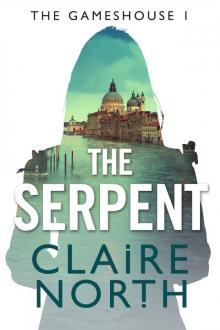 Gamehouse 01 - The Serpent
Gamehouse 01 - The Serpent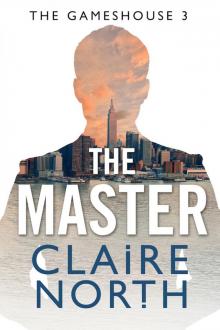 The Master
The Master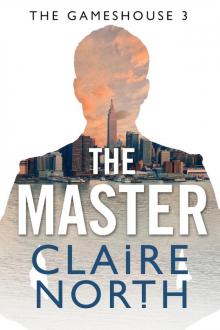 Gamehouse 03 - The Master
Gamehouse 03 - The Master The Thief
The Thief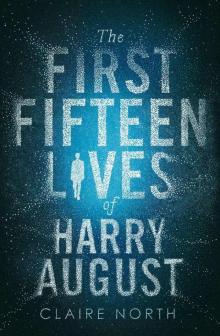 The First Fifteen Lives of Harry August
The First Fifteen Lives of Harry August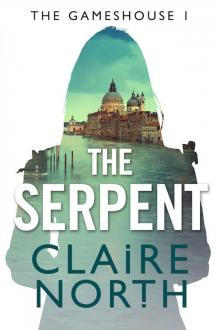 The Serpent
The Serpent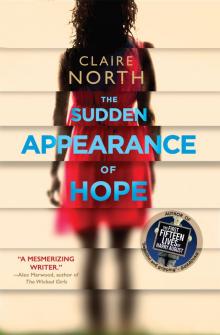 The Sudden Appearance of Hope
The Sudden Appearance of Hope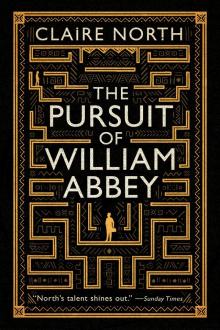 The Pursuit of William Abbey
The Pursuit of William Abbey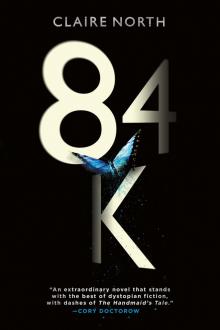 84k
84k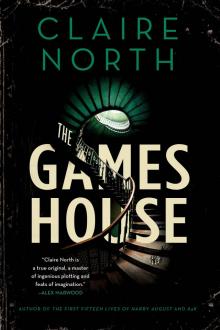 The Gameshouse
The Gameshouse Touch
Touch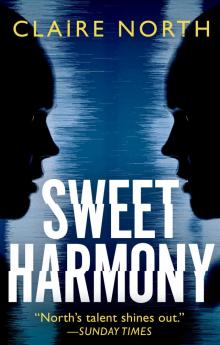 Sweet Harmony
Sweet Harmony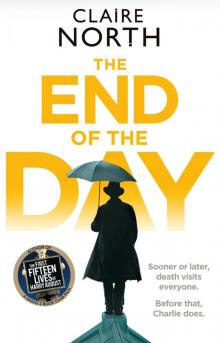 The End of the Day
The End of the Day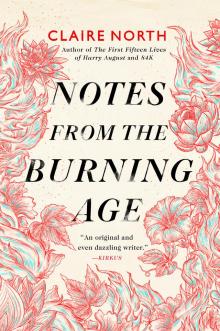 Notes from the Burning Age
Notes from the Burning Age